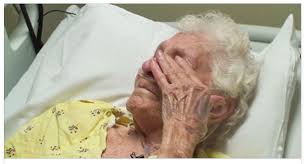By Lisa Price, M.D.When we think of aging, we often think of slowing down, getting tired easily, doing less, and a lesser ability to bounce back from an illness or setback. Attributing these issues entirely to aging, however, means we are missing what …
Continue readingTag: admission prevention
THE CAREGIVERS' LIVING ROOM A Blog by Donna Thomson: Defeating Frailty One Step at a Time
By Lisa Price, M.D.
When we think of aging, we often think of slowing down, getting tired easily, doing less, and a lesser ability to bounce back from an illness or setback. Attributing these issues entirely to aging, however, means we are missing what it really is–frailty. Frailty is a collection of health issues that often impact men and women 50 years old and older.
But while this is associated with aging, thankfully it’s not a certainty for all older adults. Early identification and intervention is the best way to lessening its impact later in life.
To be considered “frail,” according to the Journal of American Medical Association, one must have three or more of the following:
-Low Physical Activity
· – Muscle weakness
· –Slowed performance
· –Fatigue or poor endurance
· –Unintentional weight loss
By the time an older adult is considered “frail” and experiencing three or more of these issues, he or she will have a difficult time returning to an improved health status without a lot of work and is at increased risk for institutionalization and even death. Identifying and acting on this issue is crucial to maintaining and improving health status in older adults.
Working Out
Getting ahead of the issue is important to stem the body’s natural loss of muscle mass and energy reserve. Prevention is the first step in slowing its course. Although most physicians don’t have specific prevention training, they can take steps to promote exercise among older adults, which helps.
There are several ways to age successfully, many of which are simple and can be implemented at home with a little help from a physician. These include:
·
– Eating and drinking well, including following a Mediterranean diet;
· – Developing an exercise program, including balance exercises and strength training;
· – Reviewing medications to ensure all are needed, as some contribute to and worsen the condition due to side effects; and
· – Taking note of decline in appetite, weight loss, or reduction in physical activity.
– Identifying the disorder as early as possible, acting on it and planning ahead are strategies to help older adults age successfully.
Lisa Price, M.D. is Chief Medical Officer at Denver-based InnovAge, a provider of health and wellness services for older adults in California, Colorado and New Mexico. Dr. Price was a private practice geriatrician for 11 years, and then attended on the Acute Care of the Elderly (ACE) service and taught Quality Improvement at the University of Colorado. Dr. Price is Board Certified in Internal Medicine and Geriatrics, and has expertise in managed care, electronic health records and quality improvement. http://MyInnovAge.org. For health and wellness tips, visit our Caregiver Blog.
Continue reading


